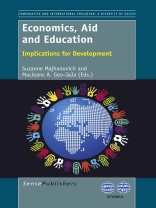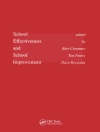It is impossible to discuss economics, development or education in a world-wide context without considering the effects of markets or globalization on these issues that have such an impact on humanity. Neoliberalism has had profound consequences for education worldwide, particularly in the developing world. The chapters in this volume include both case studies for specific countries as well as reflections on economic and educational priorities in a globalized world. How development aid is delivered, provisioned and under what conditions is debated in several chapters. Similarly, development as well as poverty are conceived in multi-dimensionalities depending on the context. In addition, the issue of what quality education has come to mean in a globalized age is also addressed. The contrast between discourses of humanistic approaches to education and those of neoliberalism as propounded by the World Bank informs discussions throughout the volume. The collection of papers in Economics, Aid and Education: Implications for Development provides a roadmap for policy makers in developing countries as well as for comparativists to the key issues and challenges of globalization, marketization and internationalization of education in a period of economic crisis. This book explores the contributions of globalization and the roadmaps developed as vehicles for societal transformation. Contributors from all parts of the globe discuss the expanding role of the World Bank’s market reforms in education in developing countries. In a detailed and practical way, the authors question false assumptions of education aid and underline the challenges of funding gaps related to development in education.
Innehållsförteckning
Acknowledgements; Economics, Aid and Education: Implications for Development ; Part I: The Politics of Aid and Development The Economics of Aid: Implications for Education and Development; The New Geopolitics of Educational Aid: From Cold Wars to Holy Wars?; Aid in Education: A Perspective From Pakistan; Critical Analysis of Economics of Education Theories with Regard to the Quality of Education; Part II: Education and Development in a Neoliberal World; How the English Language Contributes to Sustaining the Neoliberal Agenda: Another Take on the Strange Non-Demise of Neoliberalism; The Economic Capture of Criticality and the Changing University in Australia and The UK; Systems of Reason(ing) in the Idea of Education Reforms for Economic Development: The Puerto Rican Context; Decentralisation, Marketisation and Quality-Orientation: Major Pursuits of Basic Education Reforms in China from 1985 to 2010; Narrative as an Educational Tool for Human Development and Autonomy: A Case Study with Homeless Single Mothers in Uruguay; Part III: The African Context; Education Localization for Optimizing Globalization’s Opportunities and Challenges in Africa; The Rising ‘China Model’ of Educational Cooperation with Africa: Features, Discourses and Perceptions; Educational Policy Reforms in Africa for National Cohesion; Breaking Down Borders in Development Education: Something’s Gotta Give; Skills Management System for Better School-to-Work Transitions in Africa; Notes on Contributors.












